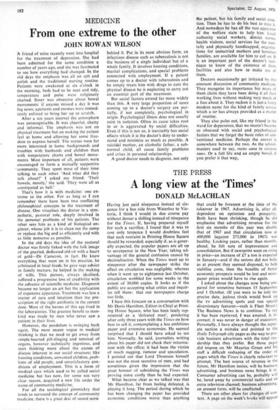MEDICINE
From one extreme to the other
JOHN ROWAN WILSON
A friend of mine recently went into hospital for the treatment of depression. She had been admitted for the same condition a number of years ago, and she was fascinated to see how everything had changed. In the old days the emphasis was all on spit and polish and the traditional nursing routine. Patients were awakened at six o'clock in the morning, beds had to be neat and tidy, temperature and pulse were religiously charted. Sister was obsessive about bowel movements: if anyone missed a day it was big news; aperients and enemas were immed- iately enlisted to bring her up to scratch.
After a ten years interval the atmosphere was unrecognisable. It was cheerful, chatty and informal. The emphasis was not on physical treatment but on making the patient feel at home and allowing her some free- dom to express herself. The nurses were far more interested in home backgroundi and troubles with husbands and children than with temperature charts and bowel move- ments. Most important of all, patients were encouraged to form a mutually supportive `community. They spent most of their time talking to each other. 'And what did they talk about?' I asked my friend. 'Their bowels, mostly,' she said. 'They were all as constipated as hell.'
That's how it is with medicine: one ex- treme to the other. For as long as I can remember there have been two conflicting philosophical concepts in the treatment of disease. One visualises the doctor in a sym- pathetic, pastoral role, deeply involved in the personal problems of his patients. The other sees him as a kind of biological en- gineer, whose job it is to clean out the sump or replace the big end as efficiently and with as little nonsense as possible.
In the old days the idea of the pastoral doctor was firmly linked with the folk image of the gnarled, dedicated old GP with a heart of gold—Dr Cameron, in fact. He knew everything that went on in his practice, he arbitrated in local feuds, he gave sage advice in family matters, he helped in the making of wills. This picture, always idealised, suffered a progressive loss of credibility with the advance of scientific medicine. Diagnosis became no longer an art but the application of expensive apparatus. Treatment was less a matter of care and intuition than the pre- scription of the right antibiotic in the correct dose. Most of the heroes of this age lived in the laboratories. The greatest benefit to man- kind was made by men who never saw a patient in their lives.
HoWever, the pendulum is swinging back again. The most recent vogue in medical thinking is that we need to get away from simple-hearted pill-slinging and removal of organs, however technically ingenious, and start thinking more about the causes of disease inherent in our social structure; like housing conditions, unwanted children, prob- lems of old people, and unsatisfactory con- ditions of employment. This is a form of medical care which used to be called social medicine but has now, for some not very clear reason, acquired a new life under the name of community medicine.
For all the sociological gimmickry that tends to surround the concept of community medicine, there is a great deal of sound sense behind it. Put in its most obvious form, an infectious disease such as tuberculosis is not the business of a single individual but of a whole family. It involves housing conditions, marital complications, and special problems connected with employment. If a patient comes up to a doctor with tuberculosis and he simply treats him with drugs to cure the physical disease he is neglecting to carry out an essential part of the treatment.
But social factors extend far more widely than this. A very large proportion of cases coming up to a doctor's surgery are par- tially, if not completely, psychological in origin. Psychological illness does not usually exist in isolation. Often its cause takes root in or is aggravated by social difficulties. Even if this is not so, it inevitably has social effects which it is the doctor's duty to under- stand and minimise as much as possible. A suicidal mother, an alcoholic father, a sub- normal child, all cause family problems and crises in personal relationships.
A good doctor needs to diagnose, not only
the patient, but his family and social situa. tion. Then he has to do his best to treat it. And nowadays he has all the vast apparatus of the welfare state to help him. Local authority social workers, district nurses, health visitors, social services for the men- tally and physically handicapped, organisa- tions for unmarried mothers and homeless families, are available for him to call on. It is an important part of the doctor's tech- nique to know of the existence of these facilities and also how to make use of them.
Doctors occasionally get irritated by this constant discussion of community medicine. They recognise its importance but many of them claim they have been doing it all their working lives without making very much of a fuss about it. They reckon it is just a fancy modern name for the kind of family service which a GP has always provided as a matter of routine.
They also point out, like my friend in the ward for depressives, that we mustn't become so obsessed with social and psychological factors that we forget the basic rules of con- ventional medicine. Perhaps the answer is somewhere between the two. As the school- masters used to say, mens sana in corpore sano. Or a full life and an empty bowel, if you prefer it that ways






























 Previous page
Previous page